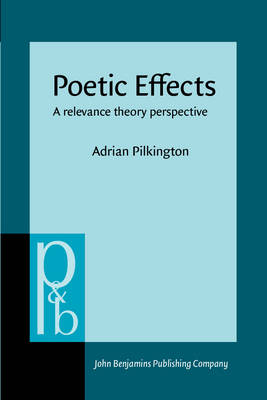
Poetic Effects
A relevance theory perspective
Seiten
2000
John Benjamins Publishing Co (Verlag)
978-90-272-5091-9 (ISBN)
John Benjamins Publishing Co (Verlag)
978-90-272-5091-9 (ISBN)
The main aim of this volume is to examine a problem relevant to both literary theory and pragmatic theory: how is literary (or poetic) communication successful and distinctive as literary communication?
Poetic Effects: A Relevance Theory Perspective offers a pragmatic account of the effects achieved by the poetic use of rhetorical tropes and schemes. It contributes to the pragmatics of poetic style by developing work on stylistic effects in relevance theory. It also contributes to literary studies by proposing a new theoretical account of literariness in terms of mental representations and mental processes.
The book attempts to define literariness in terms of text-internal linguistic properties, cultural codes or special purpose reading strategies, as well as suggestions that the notion of literariness should be dissolved or rejected. It challenges the accounts of language and verbal communication that underpin such positions and outlines the theory of verbal communication developed within relevance theory that supports an explanatory account of poetic effects and a new account of literariness. This is followed by a broader discussion of philosophical and psychological issues having a bearing on the question of what is expressed non-propositionally in literary communication. The discussion of emotion, qualitative experience and, more specifically, aesthetic experience provides a fuller characterisation of poetic effects and ‘poetic thought’.
Poetic Effects: A Relevance Theory Perspective offers a pragmatic account of the effects achieved by the poetic use of rhetorical tropes and schemes. It contributes to the pragmatics of poetic style by developing work on stylistic effects in relevance theory. It also contributes to literary studies by proposing a new theoretical account of literariness in terms of mental representations and mental processes.
The book attempts to define literariness in terms of text-internal linguistic properties, cultural codes or special purpose reading strategies, as well as suggestions that the notion of literariness should be dissolved or rejected. It challenges the accounts of language and verbal communication that underpin such positions and outlines the theory of verbal communication developed within relevance theory that supports an explanatory account of poetic effects and a new account of literariness. This is followed by a broader discussion of philosophical and psychological issues having a bearing on the question of what is expressed non-propositionally in literary communication. The discussion of emotion, qualitative experience and, more specifically, aesthetic experience provides a fuller characterisation of poetic effects and ‘poetic thought’.
1. Acknowledgements; 2. Introduction; 3. 1. Literary studies and literary theory; 4. 2. Theories of literariness, language and communication in literary studies; 5. 3. Pragmatic Theory; 6. 4. Metaphor; 7. 5. Schemes and verse effects; 8. 6. Emotion, attitude and sentimentality; 9. 7. Varieties of affective experience; 10. 8. Conclusion; 11. References; 12. Index of Names; 13. Index of Subjects
| Erscheint lt. Verlag | 15.5.2000 |
|---|---|
| Reihe/Serie | Pragmatics & Beyond New Series ; 75 |
| Verlagsort | Amsterdam |
| Sprache | englisch |
| Gewicht | 330 g |
| Themenwelt | Geisteswissenschaften ► Philosophie ► Sprachphilosophie |
| ISBN-10 | 90-272-5091-X / 902725091X |
| ISBN-13 | 978-90-272-5091-9 / 9789027250919 |
| Zustand | Neuware |
| Haben Sie eine Frage zum Produkt? |
Mehr entdecken
aus dem Bereich
aus dem Bereich
Macht und Legitimität politischer Sprache im Prozess der europäischen …
Buch | Softcover (2023)
Nomos (Verlag)
CHF 103,60
Wie die Menschheit zu ihrer größten Erfindung kam
Buch | Softcover (2022)
C.H.Beck (Verlag)
CHF 25,20


